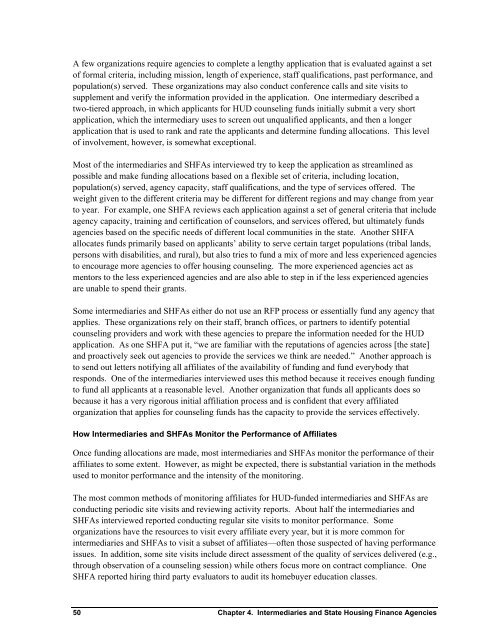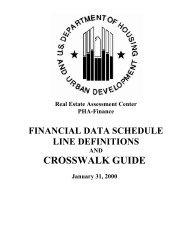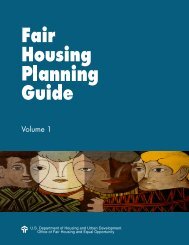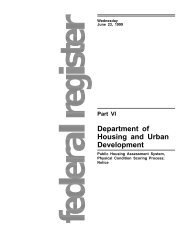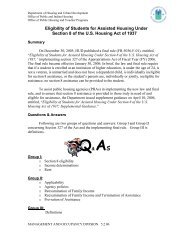Housing Counseling Process Evaluation and Design of ... - HUD User
Housing Counseling Process Evaluation and Design of ... - HUD User
Housing Counseling Process Evaluation and Design of ... - HUD User
Create successful ePaper yourself
Turn your PDF publications into a flip-book with our unique Google optimized e-Paper software.
A few organizations require agencies to complete a lengthy application that is evaluated against a set<br />
<strong>of</strong> formal criteria, including mission, length <strong>of</strong> experience, staff qualifications, past performance, <strong>and</strong><br />
population(s) served. These organizations may also conduct conference calls <strong>and</strong> site visits to<br />
supplement <strong>and</strong> verify the information provided in the application. One intermediary described a<br />
two-tiered approach, in which applicants for <strong>HUD</strong> counseling funds initially submit a very short<br />
application, which the intermediary uses to screen out unqualified applicants, <strong>and</strong> then a longer<br />
application that is used to rank <strong>and</strong> rate the applicants <strong>and</strong> determine funding allocations. This level<br />
<strong>of</strong> involvement, however, is somewhat exceptional.<br />
Most <strong>of</strong> the intermediaries <strong>and</strong> SHFAs interviewed try to keep the application as streamlined as<br />
possible <strong>and</strong> make funding allocations based on a flexible set <strong>of</strong> criteria, including location,<br />
population(s) served, agency capacity, staff qualifications, <strong>and</strong> the type <strong>of</strong> services <strong>of</strong>fered. The<br />
weight given to the different criteria may be different for different regions <strong>and</strong> may change from year<br />
to year. For example, one SHFA reviews each application against a set <strong>of</strong> general criteria that include<br />
agency capacity, training <strong>and</strong> certification <strong>of</strong> counselors, <strong>and</strong> services <strong>of</strong>fered, but ultimately funds<br />
agencies based on the specific needs <strong>of</strong> different local communities in the state. Another SHFA<br />
allocates funds primarily based on applicants’ ability to serve certain target populations (tribal l<strong>and</strong>s,<br />
persons with disabilities, <strong>and</strong> rural), but also tries to fund a mix <strong>of</strong> more <strong>and</strong> less experienced agencies<br />
to encourage more agencies to <strong>of</strong>fer housing counseling. The more experienced agencies act as<br />
mentors to the less experienced agencies <strong>and</strong> are also able to step in if the less experienced agencies<br />
are unable to spend their grants.<br />
Some intermediaries <strong>and</strong> SHFAs either do not use an RFP process or essentially fund any agency that<br />
applies. These organizations rely on their staff, branch <strong>of</strong>fices, or partners to identify potential<br />
counseling providers <strong>and</strong> work with these agencies to prepare the information needed for the <strong>HUD</strong><br />
application. As one SHFA put it, “we are familiar with the reputations <strong>of</strong> agencies across [the state]<br />
<strong>and</strong> proactively seek out agencies to provide the services we think are needed.” Another approach is<br />
to send out letters notifying all affiliates <strong>of</strong> the availability <strong>of</strong> funding <strong>and</strong> fund everybody that<br />
responds. One <strong>of</strong> the intermediaries interviewed uses this method because it receives enough funding<br />
to fund all applicants at a reasonable level. Another organization that funds all applicants does so<br />
because it has a very rigorous initial affiliation process <strong>and</strong> is confident that every affiliated<br />
organization that applies for counseling funds has the capacity to provide the services effectively.<br />
How Intermediaries <strong>and</strong> SHFAs Monitor the Performance <strong>of</strong> Affiliates<br />
Once funding allocations are made, most intermediaries <strong>and</strong> SHFAs monitor the performance <strong>of</strong> their<br />
affiliates to some extent. However, as might be expected, there is substantial variation in the methods<br />
used to monitor performance <strong>and</strong> the intensity <strong>of</strong> the monitoring.<br />
The most common methods <strong>of</strong> monitoring affiliates for <strong>HUD</strong>-funded intermediaries <strong>and</strong> SHFAs are<br />
conducting periodic site visits <strong>and</strong> reviewing activity reports. About half the intermediaries <strong>and</strong><br />
SHFAs interviewed reported conducting regular site visits to monitor performance. Some<br />
organizations have the resources to visit every affiliate every year, but it is more common for<br />
intermediaries <strong>and</strong> SHFAs to visit a subset <strong>of</strong> affiliates—<strong>of</strong>ten those suspected <strong>of</strong> having performance<br />
issues. In addition, some site visits include direct assessment <strong>of</strong> the quality <strong>of</strong> services delivered (e.g.,<br />
through observation <strong>of</strong> a counseling session) while others focus more on contract compliance. One<br />
SHFA reported hiring third party evaluators to audit its homebuyer education classes.<br />
50<br />
Chapter 4. Intermediaries <strong>and</strong> State <strong>Housing</strong> Finance Agencies


